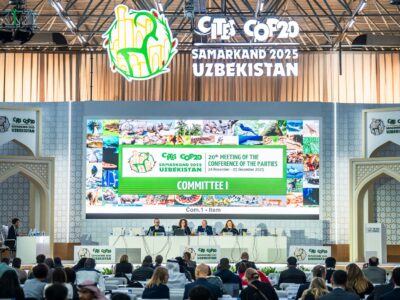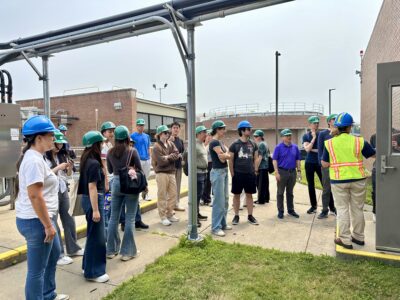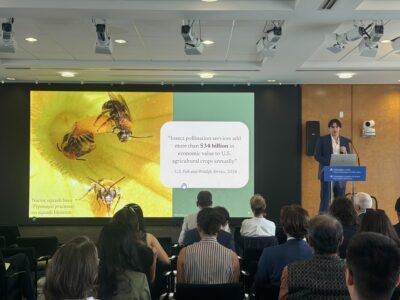
When MPA in Environmental Science and Policy alum Caroline Fox (’12) joined the program, she was seeking a career change and hoped that wherever she landed next would allow her to work on projects that would have a positive impact on the world. Now, as the Project Manager for the Nigeria Scale-Up Initiative at Columbia’s Earth Institute, she is doing just that. Caroline cites the program’s formal training in financial management and presentation development, as well as informal education from an international cohort, as informing her current work at the Earth Institute.
1. What is your current job and what are the responsibilities associated with your position?
I am currently the Project Manager for the Nigeria Scale-up Initiative at Columbia’s Earth Institute. Although based in New York, I spend about 30% of my time traveling to Nigeria’s capital city of Abuja. This project, funded through a grant with the Nigerian government, is designed to achieve scalable progress towards the Millennium Development Goals throughout the country. The Earth Institute provides technical expertise and support for Nigeria’s Conditional Grants Scheme to Local Government Associations (CGS-LGAs), funded by the Office of the Special Assistant to the President of the Federal Government of Nigeria. As the project manager I work with the Earth Institute’s Health, Education, and Engineering teams, and our Nigerian colleagues.
2. Do your current job responsibilities align with the professional goals that you originally had when you began the Master of Public Administration in Environmental Science and Policy program (MPA-ESP)?
When I began the program, I was seeking a career change. My ultimate goal was to work for projects that I felt passionate about, and that had the potential to impact the world in a positive way. I have certainly accomplished this in my current position, and even though this project does not currently have an explicit environmental/sustainability component for me to work on, I’m trying to include it wherever possible.
3. What skills and knowledge from the MPA-ESP program have you found to be most useful in your professional career so far?
I actually use my training from the MPA-ESP program all the time! Although I was never a workshop manager, the core management skills we learned in workshop and by constantly working in teams have been essential to my new role. In addition, creating, editing, and giving presentations, as well as financial management skills have been important. Finally, the program instilled me with a confidence that I can tackle large tasks, even for topics I am unfamiliar with, and gave me the skills to break a project down into manageable pieces.
4. What skills and tools do you hope to acquire through this job?
Through this job I am being exposed to cutting-edge development work that has implications for the future of large-scale development projects throughout the world. I hope I will learn to be more adept at navigating a large project in a charged, changing political environment, and to learn the skills that will make me a better sustainable development professional for topics domestically and abroad.
5. How has collaborating with your fellow students in class projects benefitted you professionally and personally?
I now live with three members of my graduating class, and feel lucky to have developed such strong bonds with so many of my peers. The diversity of students in this program was truly incredible; it contributed to a more exciting social circle as well as allowed for more dynamic class discussions. In addition, I learned the benefits and difficulties of collaborating with diverse personalities and cultures to accomplish tasks with extremely tight deadlines. That’s definitely not something you can learn from a textbook! I look forward, on both a personal and professional level, to seeing what wonderful things my peers do going forward, and potentially collaborating with them again.
6. What kinds of environmental initiatives do you hope to start in your new position?
My position allows me to voice and consider the sustainability management perspective on larger questions and issues in international development. I hope that the next round of development goals will have a more integrated sustainability focus, and I hope to help this project keep this in mind as we move forward.
There are a few potential avenues for more specific environmental initiatives with the Nigeria Scale-up project, but nothing that is concrete enough for me to share at this time.
7. How do you intend to utilize your degree from the MPA-ESP program to further your future career?
I believe I already have! The skills from this program have been essential in my adapting quickly to my new role. From here, I hope that my MPA-ESP background will enable me to transition into the environmental/sustainability side of development projects as my career progresses.
Students in the MPA in Environmental Science and Policy program enroll in a year-long, 54-credit program offered at Columbia University’s School of International and Public Affairs, in partnership with the Earth Institute. Throughout this one-year program, students are immersed in courses that combine Columbia University’s hands-on approach to teaching public policy and administration with pioneering thinking about the environment. During the summer semester, students learn the fundamentals of environmental science, while in the fall and spring semesters, they focus on the policy and economics necessary to becoming successful environmental analysts and managers. Visit our website to learn more about the program.



